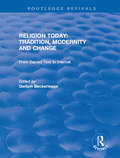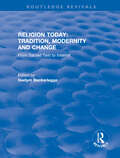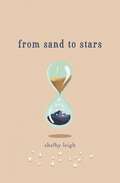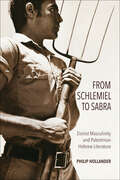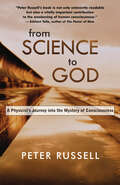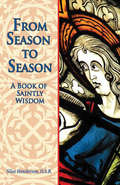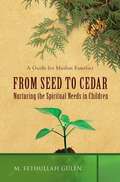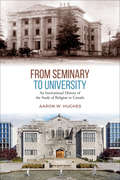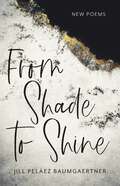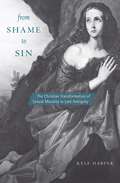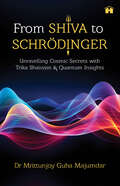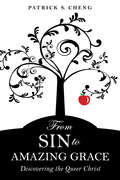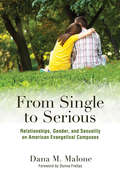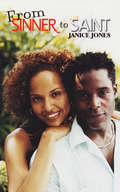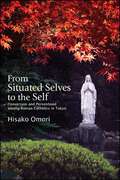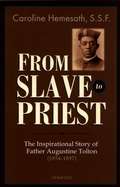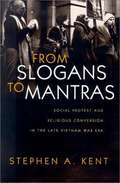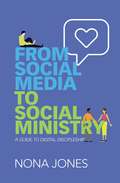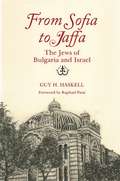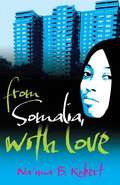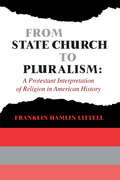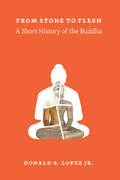- Table View
- List View
From Sacred Text to Internet: Volume 1 (Routledge Revivals)
by Gwilym BeckerleggeThis title was first published in 2001: From Sacred Text to Internet addresses two key issues affecting the global spread of religion: first, the impact of new media on the ways in which religious traditions present their messages, and second, the global relocation of religions in novel geographical and social settings. The book offers extended studies of Buddhism, Christianity, Hinduism and a wide-ranging survey chapter that refers to the presence on the Internet of many of the world's most influential religions. The chapters explore the relationship between scholarly reconstructions of the life of Jesus and representations of Jesus in contemporary popular cultures; the production and use of sacred images for the Hindu mass market; how Buddhism is represented and spread in the West; the Islamization of Egypt, its causes and influences; and the uses to which the Internet is put by religions as well as how information technology has influenced the future shape of religion. The five textbooks and Reader that make up the Religion Today Open University/Ashgate series are: o From Sacred Text to Internet o Religion and Social Transformations o Perspectives on Civil Religion o Global Religious Movements in Regional Context o Belief Beyond Boundaries o Religion Today: A Reader
From Sacred Text to Internet: Volume 1 (Routledge Revivals)
by Gwilym BeckerleggeThis title was first published in 2001: From Sacred Text to Internet addresses two key issues affecting the global spread of religion: first, the impact of new media on the ways in which religious traditions present their messages, and second, the global relocation of religions in novel geographical and social settings. The book offers extended studies of Buddhism, Christianity, Hinduism and a wide-ranging survey chapter that refers to the presence on the Internet of many of the world's most influential religions.
From Sand to Stars
by Shelby LeighDiscover the fourth collection by Shelby Leigh, the bestselling poet of Changing With the Tides and Girl Made of Glass, where she invites you to embrace the present, nurture self-growth, and discover hope in every moment of your journey through the sands of time.Ever feel like you&’re running out of time? Feel lost thinking about the future? From Sand to Stars provides a reminder that every day is a new day to find joy and self-acceptance, no matter where you are in life&’s journey. Exploring the concept of time and how it affects our mental health, From Sand to Stars will make you feel heard and seen, while inspiring you to embrace all life has to offer. Sand, section one, represents the hourglass—how time gets away from us and causes overthinking and anxiety. Soil, the second section, represents self-care, growth, and the joy that surrounds us when we look for it. Finally, Stars provides an uplifting final section on finding hope and healing around us.
From Schlemiel to Sabra: Zionist Masculinity and Palestinian Hebrew Literature (Perspectives On Israel Studies)
by Philip Hollander“Convincingly demonstrates the role of gender and sexuality in forming the Israeli state and . . . the place of literature as a force in politics.” —ChoiceIn From Schlemiel to Sabra, Philip Hollander examines how masculine ideals and images of the New Hebrew man shaped the Israeli state. In this innovative book, Hollander uncovers the complex relationship that Jews had with masculinity, interrogating narratives depicting masculinity in the new state as a transition from weak, feminized schlemiels to robust, muscular, and rugged Israelis. Turning to key literary texts by S.Y. Agnon, Y.H. Brenner, L.A. Arieli, and Aharon Reuveni, Hollander reveals how gender and sexuality were intertwined to promote a specific Zionist political agenda.A Zionist masculinity grounded in military prowess could not only protect the new state but also ensure its procreative needs and future. Self-awareness, physical power, fierce loyalty to the state and devotion to the land, humility, and nurture of the young were essential qualities that needed to be cultivated in migrants to the state. By turning to the early literature of Zionist Palestine, Hollander shows how Jews strove to construct a better Jewish future.
From Schlemiel to Sabra: Zionist Masculinity and Palestinian Hebrew Literature (Perspectives On Israel Studies)
by Philip Hollander“Convincingly demonstrates the role of gender and sexuality in forming the Israeli state and . . . the place of literature as a force in politics.” —ChoiceIn From Schlemiel to Sabra, Philip Hollander examines how masculine ideals and images of the New Hebrew man shaped the Israeli state. In this innovative book, Hollander uncovers the complex relationship that Jews had with masculinity, interrogating narratives depicting masculinity in the new state as a transition from weak, feminized schlemiels to robust, muscular, and rugged Israelis. Turning to key literary texts by S.Y. Agnon, Y.H. Brenner, L.A. Arieli, and Aharon Reuveni, Hollander reveals how gender and sexuality were intertwined to promote a specific Zionist political agenda.A Zionist masculinity grounded in military prowess could not only protect the new state but also ensure its procreative needs and future. Self-awareness, physical power, fierce loyalty to the state and devotion to the land, humility, and nurture of the young were essential qualities that needed to be cultivated in migrants to the state. By turning to the early literature of Zionist Palestine, Hollander shows how Jews strove to construct a better Jewish future.
From Science to God: A Physicists Journey into the Mystery of Consciousness
by Peter RussellFrom Science to God offers a crash course in the nature of reality. It is the story of Peter Russell's lifelong exploration into the nature of consciousness — how he went from being a strict atheist, studying mathematics and physics at Cambridge University, to realizing a profound personal synthesis of the mystical and scientific. Using his own tale of curiosity and exploration as the book’s backbone, Russell blends physics, psychology, and philosophy to reach a new worldview in which consciousness is a fundamental quality of creation. He shows how all the ingredients for this worldview are in place; nothing new needs to be discovered. We have only to put the pieces together and explore the new picture of reality that emerges. From Science to God is as much a personal story of an open-minded skeptic as it is a tour de force of scientific and religious paradigm shifts. Russell takes us from Galileo’s den to the lecture halls of Cambridge where he studied with Stephen Hawking. “If you had asked me then if there was a God,” says the best-selling author of his scientific beginnings, “I would have pointed to mathematics.” But no matter what empirical truths science offered Russell, one thorny question remained: How can something as immaterial as consciousness, ever arise from something as unconscious as matter?
From Sea to Shining Sea
by Peter Marshall David ManuelThis is a sequel in a sense to the Light and the Glory. You do not need to have read the first to enjoy this book. This book covers the years 1787-1837 in our nation's history.
From Season to Season: A Book of Saintly Wisdom
by Silas HendersonThis volume combines words of wisdom from a wide variety of saints, popes, and beati with original reflections from author Br. Silas Henderson, O.S.B. on the Solemnities and Feasts of the Roman Catholic liturgical calendar. In addition, Henderson includes extended meditations to complement the words of the saints, themselves. With an entry for every day of the year, Henderson provides words of inspiration and wisdom to serve as a starting point for one's own journey of faith, following in the footsteps of saints.
From Seed to Cedar: Nurturing the Spiritual Needs in Children
by M. Fethullah GülenFrom Seed to Cedar is a guide for Muslim families by a prominent scholar of Islam. Gülen's approach to education of Muslim kids are grounded on authoritative sources of knowledge in Islam, that is, The Qur'an and the way of Prophet Muhammad, Sunna. He effectively combines these teachings with realities of life in modern times. The result is a comprehensive road map for a Muslim family that is committed and dedicated to the education of their kids in Islam. From character education to teaching basics of Islamic practice, this book covers tasks for parents inside and outside home.
From Seminary to University: An Institutional History of the Study of Religion in Canada
by Aaron HughesThis book provides the first historical examination of the study of religion in Canada. While secular departments of religious studies would not emerge in Canada until the late 1960s, the teaching of religion under the guise of divinity, theology, the Bible, and moral philosophy has been omnipresent for much of the country’s history. The gradual transformation from the teaching of religious truths at denominational theological colleges to the non-denominational and secular study of religion at universities was a lengthy and complicated one. From Seminary to University examines this transformation against a much broader backdrop. It is not simply the history of individual departments scattered across the nation. Instead, the story reveals the many non-academic forces that made those departments possible, such as the creation of the United Church of Canada, the adoption of multiculturalism, and the introduction of the Charter of Rights and Freedoms. In recounting this transformation, From Seminary to University illuminates an important part of Canadian history.
From Shade to Shine: New Poems
by Jill Peláez BaumgaertnerThis collection of poems begins in the growing darkness of November, stretches through Advent and the seasons leading to Easter and to Pentecost, and ends in the budding light of the Scottish Orkney Islands, where the canonical hours measure time over centuries and where God broods over an austere and beautiful landscape. The measurement of time passing and returning, year after year, in the rhythms of the seasons and of the liturgical year, create the pace and the song. But in the biblical voices of Magdalene, Mary, Abel, and Eve, and in the grim historical and political realities of war and suffering, one also hears lament and finds the poet's clear-eyed gaze straight into life's challenges. Memory is at work here, too, in personal reminiscences and in theological reflection. As one philosopher has said, "All truth is God's truth." From Shade to Shine is published under Paraclete Press's Iron Pen imprint. In the book of Job, a suffering man pours out his anguish to his Maker. From the depths of his pain, he reveals a trust in God's goodness that is stronger than his despair, giving humanity some of the most beautiful and poetic verses of all time. Paraclete's Iron Pen imprint is inspired by this spirit of unvarnished honesty and tenacious hope.
From Shame to Sin
by Kyle HarperWhen Rome was at its height, an emperor’s male beloved, victim of an untimely death, would be worshipped around the empire as a god. In this same society, the routine sexual exploitation of poor and enslaved women was abetted by public institutions. Four centuries later, a Roman emperor commanded the mutilation of men caught in same-sex affairs, even as he affirmed the moral dignity of women without any civic claim to honor. The gradual transformation of the Roman world from polytheistic to Christian marks one of the most sweeping ideological changes of premodern history. At the center of it all was sex. Exploring sources in literature, philosophy, and art, Kyle Harper examines the rise of Christianity as a turning point in the history of sexuality and helps us see how the roots of modern sexuality are grounded in an ancient religious revolution. While Roman sexual culture was frankly and freely erotic, it was not completely unmoored from constraint. Offending against sexual morality was cause for shame, experienced through social condemnation. The rise of Christianity fundamentally changed the ethics of sexual behavior. In matters of morality, divine judgment transcended that of mere mortals, and shame-a social concept-gave way to the theological notion of sin. This transformed understanding led to Christianity’s explicit prohibitions of homosexuality, extramarital love, and prostitution. Most profound, however, was the emergence of the idea of free will in Christian dogma, which made all human action, including sexual behavior, accountable to the spiritual, not the physical, world.
From Shiva to Schrödinger
by Mrittunjoy Guha MajumdarFrom Shiva to Schrödinger offers a revelatory journey into the teachings of Trika Shaivism and their remarkable alignment with the discoveries of modern quantum physics. This thought-provoking book demonstrates how the profound insights of this ancient spiritual tradition predate and parallel the concepts emerging from the cutting-edge world of quantum mechanics.With clarity and depth, the author illustrates how the Trika Shaivism philosophy anticipated many of the important discoveries that modern physicists are just beginning to comprehend. He delves into the heart of both ancient spirituality and contemporary science to showcase how concepts like non-duality, the interconnectedness of all existence, and the illusion of separation resonate powerfully with the latest scientific theories of entanglement, quantum superposition, and the observer effect.All in all, From Shiva to Schrödinger is not just a bridge between ancient wisdom and contemporary insights; it is a beacon illuminating the path to a deeper understanding of our universe and ourselves. So, whether you are drawn to spiritual inquiry or scientific discovery, this book offers a transformative perspective that will enrich your contemporary quest for knowledge.
From Sin to Amazing Grace: Discovering the Queer Christ
by Patrick S ChengA theologian discusses bridging the gap between the LGBTQ community and the fundamental oppression of traditional Christian doctrines. Throughout the history of Christianity, the LGBTQ community has been condemned as unrepentant sinners who are in dire need of God’s saving grace. As a result of this condemnation, they have been subjected to great spiritual, emotional and physical abuse and violence. This issue has taken on a particular urgency in light of the horrific string of suicides of young people who were subjected to harassment and bullying by their classmates because of their gender identities or sexual preferences. In From Sin to Amazing Grace, Cheng argues that people need to be liberated from the traditional thinking about sin as a violation of divine and natural laws in which grace is understood as the strength to refrain from violating such laws. He proposes a Christological model based upon the theologies of Irenaeus, Bonaventure, and Barth, in which sin and grace are defined in terms of what God has done for us in Jesus Christ. This book will serve as a useful resource for all people who struggle to make sense of traditional Christian doctrines in the context of the twenty-first century.
From Single to Serious: Relationships, Gender, and Sexuality on American Evangelical Campuses
by Dana M. MaloneCollege students hook up and have sex. That is what many students expect to happen during their time at university—it is part of growing up and navigating the relationship scene on most American campuses today. But what do you do when you’re a student at an evangelical university? Students at these schools must negotiate a barrage of religiously imbued undercurrents that impact how they think about relationships, in addition to how they experience and evaluate them. As they work to form successful unions, students at evangelical colleges balance sacred ideologies of purity, holiness, and godliness, while also dealing with more mainstream notions of popularity, the online world, and the appeal of sexual intimacy. In From Single to Serious, Dana M. Malone shines a light on friendship, dating, and, sexuality, in both the ideals and the practical experiences of heterosexual students at U. S. evangelical colleges. She examines the struggles they have in balancing their gendered and religious presentations of self, the expectations of their campus community, and their desire to find meaningful romantic relationships.
From Sinner to Saint
by Janice JonesAntonyo Ian Demonté Simms treats women as casually as most people treat their socks, changing them frequently. With the help of his aunt LaTrece, his mother's irresponsible twin sister, Antonyo learns how to use his good looks and charisma to win the hearts--and treasures--of a vast array of female companions. Each of these women thinks that she may just be the one who can turn this hot hunk into a husband, but Antonyo has no intention of changing his womanizing ways.The only woman Antonyo can't get over on is his no-nonsense mother, LaTrina. She struggles every day, trying to instill strong morals in her son and turn him into a good man, in spite of the example set by his deadbeat father. LaTrina gives her life to Christ, and as she grows in her relationship with God, she does all in her power to convince Antonyo to do the same thing. Antonyo is impressed with the new person his mother is becoming, but he's certain that his life is fine exactly the way it is. Can a mother's love and God's all-encompassing power, grace, and mercy change a young man from sinner to saint before Satan drags him into the pits of hell?
From Situated Selves to the Self: Conversion and Personhood among Roman Catholics in Tokyo
by Hisako OmoriIn many parts of the world, the Roman Catholic Church in the twenty-first century finds itself mired in scandal, and its future prospects appear fairly dim in the eyes of many social critics. In From Situated Selves to the Self, however, Hisako Omori finds a radically different situation, with jubilant Roman Catholics in an unexpected place: Tokyo, Japan. Based on twelve months of ethnographic fieldwork, the author provides a culturally sensitive account of the transformative processes associated with becoming Catholic in Tokyo. Her ethnographically rich narrative reveals the ways in which Christianity as a cultural force can effect changes in one's personhood by juxtaposing two models of the self—one based on conventional Japanese social ideals and the other on Roman Catholic teachings. Omori takes readers to a living room ("ochanoma") in a parish, a Catholic bar in a nightclub area, Catholic charismatic meetings, and busy intersections in Tokyo. In so doing, she traces subtle yet emerging changes in women's agentive power that accompany the processes of deepening faith. From Situated Selves to the Self gives us a rare glimpse into Christianity as a cultural force in an East Asian context where Confucianism has historically been the dominant ethical framework.
From Slave to Priest: The Inspirational Story of Father Augustine Tolton (1854-1897)
by Sister Hemesath<p>Born into a black Catholic slave family, Fr. Augustine Tolton (1854-1897) conquered almost insurmountable odds to become one of the very first black priests in the United States. By his early death at 43, this pioneer black priest left behind a shining legacy of holy service to God, the Church and his people. <p>Tolton's cause for canonization has been officially opened by the Archdiocese of Chicago as announced by Cardinal Francis George. <p>The thorough scholarly research and inspirational writing by Sister Caroline Hemesath on the great legacy and courage of this former slave who became a priest in the face of incredible prejudice within the Church and society will be a source of strength for modern Christians who also face persecution. In American history, many black people have achieved success against great odds. But Father Tolton faced a different source of prejudice - an opposition from within the Church, the one institution he should have been able to rely on for compassion and support. He endured many rebuffs, as a janitor spent long hours in the church in prayer, and attended clandestine classes taught by friendly priests and nuns who saw in his eyes a deep love of God and the Church, and a determination to serve his people. Denied theological training in America, his friends helped him to receive his priestly education, and ordination, in Rome. He later became the pastor of St. Monica's Church in Chicago and established a flourishing center at St. Monica's that was the focal point for black Catholics in Chicago for 30 years. <p>The author interviewed many people who knew Father Tolton personally, including St. Katharine Drexel, and presents a deeply inspiring portrait of a great American Catholic. Book includes illustrations and photographs.</p>
From Slogans to Mantras: Social Protest and Religious Conversion In The Late Vietnam War Era
by Stephen A. KentThe author has sought out and interviewed many of the folks who first too part in politics and later in radical religious conversions during the sixties.
From Social Media to Social Ministry: A Guide to Digital Discipleship
by Nona JonesThis book outlines digital discipleship principles for building an online community and provides practical instruction for how to do it no matter how big or small a local church may be.There are more than 2.3 billion professing Christians in the world and more and more new churches launching globally, yet statistics show that in-person church attendance is declining or plateauing in every nation. Although social technology has been around for more than two decades, church leaders have long bristled at the idea of church online, ranking it as the last concern on their minds in Barna's 2020 state of the church report published February 3, 2020. And then, three weeks later, COVID-19 closed the doors of every church on earth and suddenly forced them entirely online.Nona Jones, a globally acclaimed thought leader on leveraging technology for ministry, had been leading a movement and sounding the alarm for several years to make digital discipleship a central part of every church&’s ministry approach. In From Social Media to Social Ministry, she outlines her digital discipleship principles and provides practical instruction for how to do it no matter how big or small a local church may be. There are plenty of books to help churches build a social media strategy, but this is the first book of its kind that goes beyond digital marketing to digital ministry.Readers will leave this book with:Clarity on what discipleship truly isThe data that underscores the urgency for digital discipleshipUnderstanding of the resources required to do it wellA step-by-step guide on how to implement digital discipleship into ministry plansKnowledge of the differences among and purposes of the most popular social platforms, as well as the tools best positioned for digital ministry
From Sofia to Jaffa: The Jews of Bulgaria and Israel (Raphael Patai Series in Jewish Folklore and Anthropology)
by Raphael Patai Guy H. HaskellWithin two years of the establishment of the State of Israel in 1948, an astounding 45,000 of Bulgaria's 50,000 Jews left voluntarily for Israel. This mass exodus was remarkable considering that Bulgaria was the only Axis power to prevent the deportation of its Jews to the death camps during World War II. After their arrival in Israel, the Jews of Bulgaria were recognized as a model immigrant group in a fledgling state attempting to absorb hundreds of thousands of newcomers from more than eighty countries. They became known for their independence, self-reliance, honesty, and hard work. <P><P> From Sofia to Jaffa chronicles the fascinating saga of a population relocated, a story that has not been told until now. Beginning with a study of the community in Bulgaria and the factors that motivated them to leave their homeland, this book documents the journey of the Bulgarian Jews to Israel and their adaptation to life there.
From Somalia with Love
by Na'Ima B. Robert"My name is Safia Dirie. My family has always been my mum, Hoyo, and my two older brothers, Ahmed and Abdullahi. I don't really remember Somalia -- I'm an East London girl, through and through. But now Abo, my father, is coming from Somalia to live with us, after 12 long years. How am I going to cope?" Safia knows that there will be changes ahead but nothing has prepared her for the reality of dealing with Abo's cultural expectations, her favorite brother Ahmed's wild ways, and the temptation of her cousin Firdous's party-girl lifestyle. Safia must come to terms with who she is-- as a Muslim, as a teenager, as a poet, as a friend, but most of as a daughter to a father she has never known. Safia must find her own place in the world, so both father and daughter can start to build the relationship they both long for.
From State Church to Pluralism: A Protestant Interpretation of Religion in American History
by Franklin LittellFor most of our history, American religious life has been dominated by a view of church history in which we appear as mere deposits of European religious culture. In fact, however, the freedom of Americans to choose without penalty to join any religious body or none at all is new in human history. This book is an effort to understand and interpret how we arrived at our present situation and, in doing so, to clarify many cultural, social and political issues.
From Stone to Flesh: A Short History of the Buddha
by Donald S. LopezThis is a book about the Buddha before he was the Buddha. How was he portrayed before he became the pacific and positive figure so familiar and beloved today?
From Stone to Flesh: A Short History of the Buddha (Buddhism And Modernity Ser.)
by Donald S. Lopez Jr.We have come to admire Buddhism for being profound but accessible, as much a lifestyle as a religion. The credit for creating Buddhism goes to the Buddha, a figure widely respected across the Western world for his philosophical insight, his teachings of nonviolence, and his practice of meditation. But who was this Buddha, and how did he become the Buddha we know and love today? Leading historian of Buddhism Donald S. Lopez Jr. tells the story of how various idols carved in stone—variously named Beddou, Codam, Xaca, and Fo—became the man of flesh and blood that we know simply as the Buddha. He reveals that the positive view of the Buddha in Europe and America is rather recent, originating a little more than a hundred and fifty years ago. For centuries, the Buddha was condemned by Western writers as the most dangerous idol of the Orient. He was a demon, the murderer of his mother, a purveyor of idolatry. Lopez provides an engaging history of depictions of the Buddha from classical accounts and medieval stories to the testimonies of European travelers, diplomats, soldiers, and missionaries. He shows that centuries of hostility toward the Buddha changed dramatically in the nineteenth century, when the teachings of the Buddha, having disappeared from India by the fourteenth century, were read by European scholars newly proficient in Asian languages. At the same time, the traditional view of the Buddha persisted in Asia, where he was revered as much for his supernatural powers as for his philosophical insights. From Stone to Flesh follows the twists and turns of these Eastern and Western notions of the Buddha, leading finally to his triumph as the founder of a world religion.
